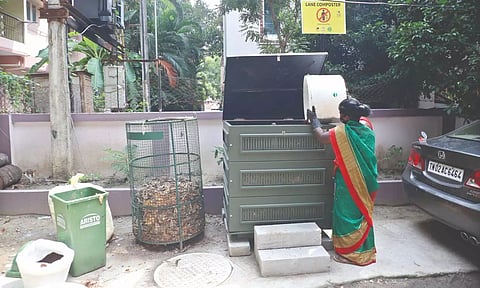

CHENNAI: Residents of Adyar have installed a three-lane composter with a capacity of 750-800 kg/month for solid waste management. Wet waste will be composed in the equipment, which has a capacity of making 20-25 kg of compost each day.
The wet waste will be deposited in the composter for a month, and manure will be distributed to the residents to encourage segregation at home.
In 2018, Janani Venkatesh, Secretary, Kasturba Nagar Association (ROKA), started segregating and composting wet waste in her home, but it was not sufficient. So, she reached out to other residents on the Third Main Road.
Along with others who also faced the same issue, Janani formed ROKA for solid waste management.
ROKA has been doing door-to-door campaigning and events based on solid waste management, and activities for children since its inception.
The lane composters were inspired by a community-based model constructed by the residents of HSR Layout, Bengaluru. The waste collected there was composed over there itself, with the help of Okapi Research and Advisory, which is a research company from IIT Madras, and the Chennai Resilience Centre.
The project was launched in Kasturba Nagar on October 11 by the chief engineer for solid waste management, N Mahesan, along with the ward councillor, Subashini Durai. The project is part of the ‘We segregate’ project, which is funded by the Resilience Cities Network and the Circulate Initiative. The funds were allotted for three-lane composters.
The project aims at segregating waste up to 90% in Kasturba Nagar and also inspire other communities to take it up.
Every day in Zone 13, the waste management contractor collects waste from each house in a battery-operated vehicle. The waste is being collected in three bins according to its classification – organic, dry, and hazardous sanitary waste.
“Students of IIT-M developed an equipment to collect separated multi-layer plastics. A first-of-its-kind in the city, it hasn’t been launched yet. But along with students, we’re introduced it in the area. Only multi-layer plastics like chocolate wrappers, chip packets, etc., are collected, which will be sent for pyrolysis to the cement factories, where it could be used as fuel,” explains Janani.